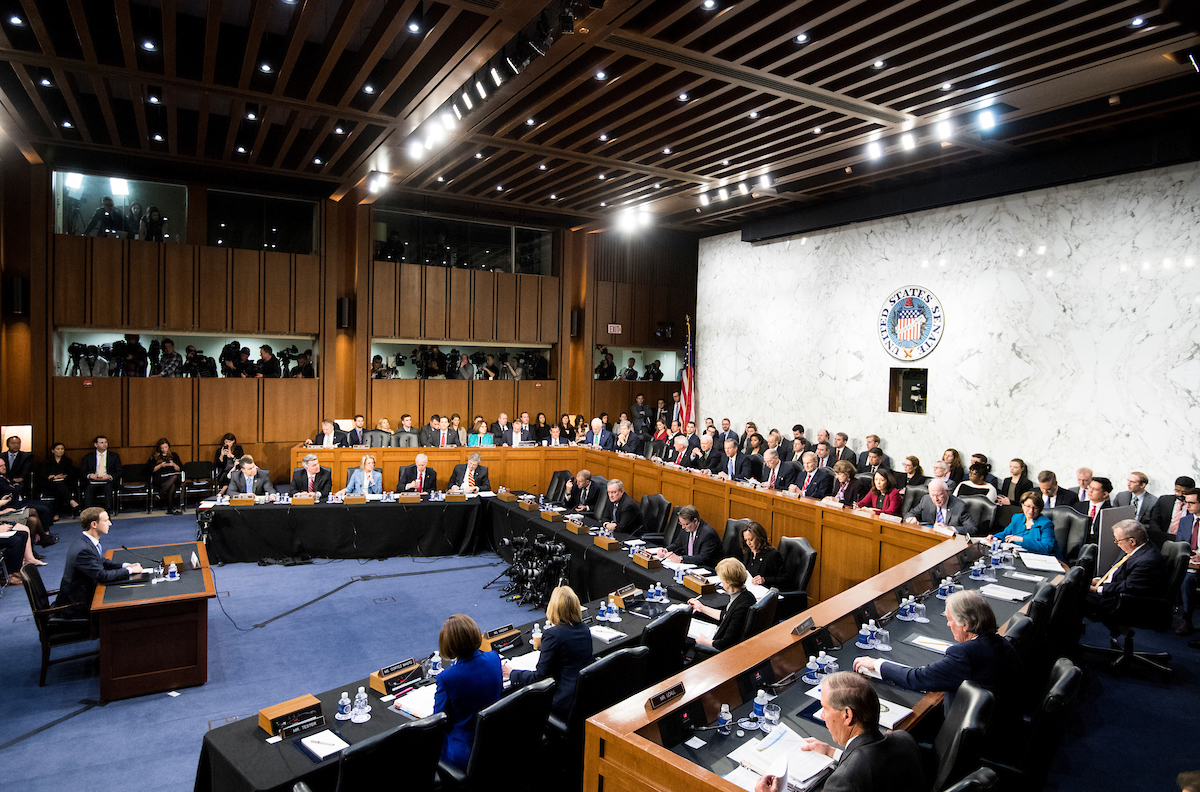Senators Face Off With Zuckerberg in Marathon Hearing
Joint hearing starts off with pop, brings unexpected questions, and then gradually fades

“Mr. Zuckerberg, would you be comfortable sharing with us the name of the hotel you stayed in last night?”
Senate Minority Whip Richard J. Durbin asked that of Facebook CEO Mark Zuckerberg nearly two hours into Tuesday afternoon’s headline-grabbing Senate hearing.
The Facebook chief predictably stammered a bit at the Illinois Democrat’s question, and did so again when asked whether he would disclose the names of people he had texted with in recent days.
“Senator, no, I would probably not choose to do that publicly here,” he said.
It was the star tech executive’s first time in the klieg lights of the Hart Building, and the session was not without tension, even with each senator limited to roughly five minutes of questioning. But Zuckerberg seemed well prepared, and there were few fireworks.
Watch: Some of the Most Colorful Moments of Zuckerberg’s First Hill Hearing
One of the most adversarial exchanges came with Sen. Ted Cruz just before the hearing’s first break. The conservative Republican from Texas asked Zuckerberg why Facebook took down some conservative content, including a page touting “Chick-fil-A Appreciation Day.”
“There are a great many Americans who are deeply concerned that Facebook and other tech companies are engaged in a pervasive pattern of bias and political censorship,” Cruz said.
Zuckerberg said as Facebook CEO he had never engaged in the practice of hiring anyone on the basis of political views and stressed that it would not be his intention to have content screened on such a basis.
But a similar exchange between Zuckerberg and Sen. Ben Sasse cut to the quick, with the Nebraska Republican pressing the CEO about his definition of hate speech, for which Zuckerberg lacked a clear answer.
Sasse pointed out that on Facebook, on an issue like abortion rights, for instance, the definition of hate speech can get complicated in a hurry.
“You may decide or Facebook may decide it needs to police a whole bunch of speech that I think America might be better off not having policed by one company that has a really big and powerful platform,” Sasse said.
Figuring out such definitions is a task for “America,” Zuckerberg replied.
“As we’re able to technologically shift toward having AI proactively look at content, I think that that’s going to create massive questions for society about what obligations we want companies to fulfill,” he said.
Sen. Patrick. J. Leahy, a former chairman of the Judiciary panel, took his line of questioning half a world away from Washington, D.C.
The Democrat from Vermont focused on how the use of Facebook may have inflamed tensions in Myanmar and contributed to atrocities against the Rohingya Muslim population.
“What’s happening in Myanmar is horrible,” Zuckerberg said.
“U.N. investigators have blamed you — blamed Facebook for playing a role in the genocide,” Leahy said. “We all agree it’s terrible. How can you dedicate, and will you dedicate, resources to make sure such hate speech is taken down within 24 hours?”
Zuckerberg conceded that the company needs to work on content review and identifying hate speech for flagging through artificial intelligence and human resources in languages other than English.
“We’re working with civil society in Myanmar to identify specific hate figures so we can take down their accounts, rather than specific pieces of content,” he said. “We’re standing up a product team to do specific product changes in Myanmar and other countries that may have similar issues in the future to prevent this from happening.”
Facebook’s lobbyists are going to be earning their money, though. Throughout the hearing, Zuckerberg repeatedly referred questions seeking data to his team.
The air first left the room when Democratic Sen. Maria Cantwell started questioning Zuckerberg about what Facebook’s team may have done in conjunction with data mining operations and the Cambridge Analytica firm, whose collection of user data precipitated the public debate that led Zuckerberg to make his first appearance as a congressional witness.
“Do you think that during the 2016 campaign, as Cambridge Analytica was providing support to the Trump campaign under Project Alamo, were there any Facebook people involved in that sharing of technique and information?” Cantwell asked.
“I don’t know that our employees were involved with Cambridge Analytica,” responded Zuckerberg. “Although I know that we did help out the Trump campaign overall in sales support in the same way that we do with other companies.”
But even as high-profile an event as Zuckerberg’s first congressional testimony could not command the attention of the chamber for too long. As the hearing dragged on well past 5 p.m., the cable channels began cutting away from live coverage.
It was mainly junior members of the Senate who remained in the room. The second row that had been added to the front of the dais turned out to be largely unnecessary.





